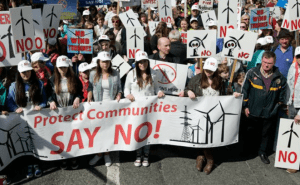Focus
Develop a social science agenda for research related to renewable energy that integrates, broadens, and builds upon current research in the social sciences at PSU and is grounded in the technologies being developed by scientist and engineers at PSU.
Highlights
- Pennsylvania residents have access to a variety of energy sources, including fossil fuels and renewables. However, there are many barriers to acceptance of energy technologies, including economic costs, uncertain futures, experiences with energy suppliers, and the content of intrapersonal, interpersonal, and media coverage that provide information about renewable energy.
- Social science research, including Penn State research, deals with perceptions of energy policies, communicating scientific information to the public, visualization of energy extraction sites, and media narratives contribution to opinions and environmentally relevant civic engagement.
- There is potential for much more research with greater numbers of networked people in the social sciences informed by research done by scientist and engineers.
Goals
- Increase interdisciplinary collaborations and application of social science methodologies to investigate how communities come to understand and talk about energy generation, technologies, and use.
- Obtain funding related to the social and psychological aspects of energy use and public reactions to energy technologies and policies.
- Develop outreach activities around community engagement with renewable energy use.
Overview

People’s understandings of energy are likely to be socially constructed—formed from socially shared information about energy generation, technologies, use, and related policies–perhaps generated from personal experiences with energy use and bills, literature and podcasts about experiences with wind turbines as seen from one’s backyard, and snippets of news about benefits and harms of renewable energy generation and policies. The resulting social constructions are likely highly influential because they can amplify or attenuate perceived risks, communicate social norms about energy use, and activate social identities that influence responses to policies and the perceived importance of the topic. Social constructions may exclude important considerations, such as those related to geographic or temporally distal environmental and social justice. The following areas of inquiry would help build a program that contains a strong social science contribution to research on renewable energy at Penn State.
The Stories People Tell About Energy
How do communities talk about energy use and energy technologies? What is the content of their stories? How willing are various types of people to talk about energy, and with whom? How are these conversations influenced by politics? And how do media contribute to or shift the narratives surrounding energy use in different types of communities? These questions underscore the central role of interpersonal and mediated conversations in shaping how people respond to energy use and new energy technologies. Even when concern about climate change, many do not talk about it. Sociologist at PSU have years of experience developing student led and facilitated discussions about difficult topics including climate change. These could be expanded to target discussions about energy. Additionally, research is needed to examine actual community conversations about energy and technology, how to productively facilitate them.
Risk perception
 Greater understanding of risk perception as it relates to the development and implementation of renewable energy generation is needed. Although environmental risk perception has been studied for decades, much of this research originated in studying perceived risk from nuclear power. Currently, there is much research on perceived climate change risk perception and its associations with policy support, such as support for funding research on renewable energy. However, support for research is different from support for its implementation as NIMBY considerations highlight: despite general support, some communities resist wind turbines in their “back yards” (NIMBY). Additionally, anticipated benefits and harms of energy policies predicts support for the policies beyond climate change risk perception and political identity. Research is needed to pinpoint how communication (interpersonal and mediated via technology), and the resulting narratives communities construct about energy use, influence perceptions of from renewable energy to be better able to listen do and address community concerns.
Greater understanding of risk perception as it relates to the development and implementation of renewable energy generation is needed. Although environmental risk perception has been studied for decades, much of this research originated in studying perceived risk from nuclear power. Currently, there is much research on perceived climate change risk perception and its associations with policy support, such as support for funding research on renewable energy. However, support for research is different from support for its implementation as NIMBY considerations highlight: despite general support, some communities resist wind turbines in their “back yards” (NIMBY). Additionally, anticipated benefits and harms of energy policies predicts support for the policies beyond climate change risk perception and political identity. Research is needed to pinpoint how communication (interpersonal and mediated via technology), and the resulting narratives communities construct about energy use, influence perceptions of from renewable energy to be better able to listen do and address community concerns.
Community Impact
Understanding the current, potential, and anticipated impacts of energy use and new energy technologies on communities can prepare residents for shifts in availability, pricing, and community upheaval that may result. While certain communities bear the brunt of environmental and health impacts of fossil fuel extraction and impacts of climate change, these same communities may be most vulnerable to transition costs to renewable energy and least able to make adjustments in their live to take advantage of new technologies. Additionally, perceptions are not static and vary across and within communities; most people value research on the development of renewable energy but, as the actual implementation begins, many become concerned about the visual and ecological impacts of the production of energy. Recognizing that social movements may coalesce around energy use, particularly as it applies to climate change and environmental justice, can provide additional insights as to the role of renewable energy in community life.
Strategic Planning
To facilitate research into the above areas of research, we recommend Faculty hires with expertise in the following areas:
- Perceived risk of renewable energy innovations;
- Social and environmental justice as it relates to the food–energy-water nexus; and
- The application of field research, mixed methods, and innovative methods for studying renewable energy and energy policies that involve virtual and immersive reality, analyses of “big data” such as posting on social media, and social network analyses.
Funding is needed to develop collaborative social science-based research teams (with the assistance of staff, post-docs, and course releases) in order to:
- Develop and coalesce on a social science perspective and research questions about renewable energy and technologies;
- Implement and test community outreach programs that could, for example, use augmented reality to provide informed choices about the visual changes that would take place in their communities; and
- Train students in interdisciplinary research that crosses social, engineering, and physical sciences with workshops and classes.
Current Participants
- Janet Swim (Psychology)
- Jessica Myrick (Media Studies)
- Alexander Klippel (Geography)
- Leland Glenna (Rural Sociology)
Education and Outreach
Example Courses:
- COMM 328
- PSYCH 419
- CED 417
- CED 452
- GEOG 197F
- GEOG 560
Outreach activities: TBD, but includes community discussions, working with informal science learning centers, applying new digital technology.
